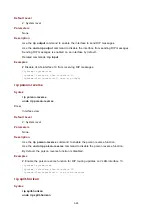
3-14
RIPv2 can be disabled from receiving host routes, but RIPv1 cannot.
Examples
# Disable RIP from receiving host routes.
<Sysname> system-view
[Sysname] rip 1
[Sysname-rip-1] undo host-route
import-route (RIP view)
Syntax
import-route protocol
[
process-id
|
all-processes
|
allow-ibgp
] [
cost
cost
|
route-policy
route-policy-name
|
tag tag
] *
undo import-route protocol
[
process-id
]
View
RIP view
Default Level
2: System level
Parameters
protocol
: Specifies a routing protocol from which to redistribute routes. At present, it can be
bgp
,
direct
,
isis
,
ospf
,
rip
, or
static
.
process-id
: Process ID, in the range of 1 to 65535. The default is 1. It is available only when the
protocol is
isis
,
rip
, or
ospf
.
all-processes
: Enables route redistribution from all the processes of a protocol. This keyword
takes effect only when the protocol is
rip
,
ospf
, or
isis
.
allow-ibgp
: When the
protocol
argument is set to
bgp
,
allow-ibgp
is an optional keyword. The
import-route bgp
command only redistributes eBGP routes, while the
import-route bgp
allow-ibgp
command additionally redistributes iBGP routes, which may cause routing loops. Be
cautious when using it.
cost
: Cost for redistributed routes, in the range of 0 to 16. If
cost
is not specified, the default
cost specified by the
default cost
command applies.
tag
: Tag marking redistributed routes, in the range of 0 to 65,535. The default is 0.
route-policy
route-policy-name
: Specifies a route policy with 1 to 19 characters.
Description
Use the
import-route
command to enable route redistribution from another routing protocol.
Use the
undo import-route
command to disable route redistribution.
By default, RIP does not redistribute routes from other routing protocols.
Note that:
















































